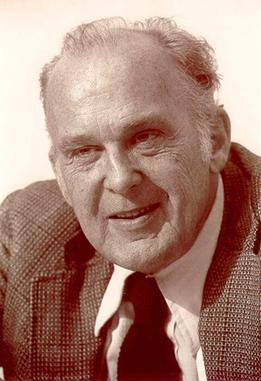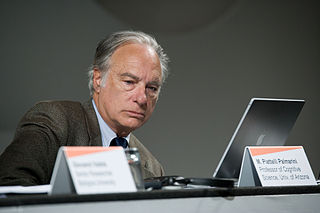Related Research Articles
Evolutionary linguistics or Darwinian linguistics is a sociobiological approach to the study of language. Evolutionary linguists consider linguistics as a subfield of sociobiology and evolutionary psychology. The approach is also closely linked with evolutionary anthropology, cognitive linguistics and biolinguistics. Studying languages as the products of nature, it is interested in the biological origin and development of language. Evolutionary linguistics is contrasted with humanistic approaches, especially structural linguistics.
Evolutionary psychology is a theoretical approach in psychology that examines cognition and behavior from a modern evolutionary perspective. It seeks to identify human psychological adaptations with regards to the ancestral problems they evolved to solve. In this framework, psychological traits and mechanisms are either functional products of natural and sexual selection or non-adaptive by-products of other adaptive traits.

In philosophy, systems theory, science, and art, emergence occurs when a complex entity has properties or behaviors that its parts do not have on their own, and emerge only when they interact in a wider whole.

Theoretical Computer Science (TCS) is a subset of general computer science and mathematics that focuses on mathematical aspects of computer science such as the theory of computation (TOC), formal language theory, the lambda calculus and type theory.
In mathematics and computer science, the Krohn–Rhodes theory is an approach to the study of finite semigroups and automata that seeks to decompose them in terms of elementary components. These components correspond to finite aperiodic semigroups and finite simple groups that are combined in a feedback-free manner.

Live coding, sometimes referred to as on-the-fly programming, just in time programming and conversational programming, makes programming an integral part of the running program.
A complex adaptive system is a system that is complex in that it is a dynamic network of interactions, but the behavior of the ensemble may not be predictable according to the behavior of the components. It is adaptive in that the individual and collective behavior mutate and self-organize corresponding to the change-initiating micro-event or collection of events. It is a "complex macroscopic collection" of relatively "similar and partially connected micro-structures" formed in order to adapt to the changing environment and increase their survivability as a macro-structure. The Complex Adaptive Systems approach builds on replicator dynamics.

Donald Thomas Campbell was an American social scientist. He is noted for his work in methodology. He coined the term evolutionary epistemology and developed a selectionist theory of human creativity. A Review of General Psychology survey, published in 2002, ranked Campbell as the 33rd most cited psychologist of the 20th century.
Evolutionary educational psychology is the study of the relation between inherent folk knowledge and abilities and accompanying inferential and attributional biases as these influence academic learning in evolutionarily novel cultural contexts, such as schools and the industrial workplace. The fundamental premises and principles of this discipline are presented below.

The European Association for Evolutionary Political Economy (EAEPE) is a pluralist forum of social scientists that brings together institutional and evolutionary economists broadly defined. EAEPE members are scholars working on realistic approaches to economic theory and economic policy. With a membership of about 500, EAEPE is now the foremost European association for heterodox economists and the second-largest association for economists in Europe.

Biolinguistics can be defined as the study of biology and the evolution of language. It is highly interdisciplinary as it is related to various fields such as biology, linguistics, psychology, anthropology, mathematics, and neurolinguistics to explain the formation of language. It seeks to yield a framework by which we can understand the fundamentals of the faculty of language. This field was first introduced by Massimo Piattelli-Palmarini, professor of Linguistics and Cognitive Science at the University of Arizona. It was first introduced in 1971, at an international meeting at the Massachusetts Institute of Technology (MIT).
Ray C. Dougherty is an American linguist and was a member of the Arts and Science faculty at New York University until 2014 (retired). He received his bachelor's and master's degrees in engineering from Dartmouth College in the early 1960s and his Ph.D. in linguistics from the Massachusetts Institute of Technology in 1968. At MIT, Dougherty was one of the first students of Noam Chomsky, working in the field of transformational grammar. During the Linguistics Wars of the 1970s, Dougherty was a critic of the generative semantics movement. Specializing in computational linguistics, Dougherty has published several books and articles on the subject.
Universal Darwinism, also known as generalized Darwinism, universal selection theory, or Darwinian metaphysics, is a variety of approaches that extend the theory of Darwinism beyond its original domain of biological evolution on Earth. Universal Darwinism aims to formulate a generalized version of the mechanisms of variation, selection and heredity proposed by Charles Darwin, so that they can apply to explain evolution in a wide variety of other domains, including psychology, linguistics, economics, culture, medicine, computer science, and physics.
Within biological systems, degeneracy occurs when structurally dissimilar components/pathways can perform similar functions under certain conditions, but perform distinct functions in other conditions. Degeneracy is thus a relational property that requires comparing the behavior of two or more components. In particular, if degeneracy is present in a pair of components, then there will exist conditions where the pair will appear functionally redundant but other conditions where they will appear functionally distinct.
Evolutionary psychology of language is the study of the evolutionary history of language as a psychological faculty within the discipline of evolutionary psychology. It makes the assumption that language is the result of a Darwinian adaptation.
Anna Maria Di Sciullo is a professor in the Linguistics Department at the Université du Québec à Montréal and visiting scientist at the Department of Linguistics at New York University. Her research areas are Theoretical Linguistics, Computational Linguistics and Biolinguistics.

The following outline is provided as an overview of and topical guide to evolution:

Allan Combs is an American psychologist and parapsychologist who attempts to combine his ideas of consciousness and systems theory.
Theory of language is a topic in philosophy of language and theoretical linguistics. It has the goal of answering the questions "What is language?"; "Why do languages have the properties they do?"; or "What is the origin of language?". In addition to these fundamental questions, the theory of language also seeks to understand how language is acquired and used by individuals and communities. This involves investigating the cognitive and neural processes involved in language processing and production, as well as the social and cultural factors that shape linguistic behavior.